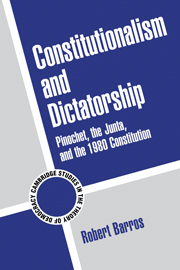Book contents
- Frontmatter
- Contents
- Foreword
- Acknowledgments
- Abbreviations
- Introduction
- 1 Dictatorship, Legality, and Institutional Constraints
- 2 The Constitution of the Exception: Defining the Rules of Military Rule
- 3 The Constitution and the Dictatorship: The Supreme Court and the Constitutionality of Decree-Laws
- 4 The Shadowy Boundary between Force and Law: The Judiciary, Repression, and the Cosmetic Limitation of Emergency Powers
- 5 Constitutionalization without Transition: Prompting the Dual Constitution of 1980
- 6 The Permanent Text: Constitutional Controls or Military Tutelage?
- 7 Even Custom Shoes Bind: Military Rule under the Constitution, 1981–1988
- 8 Military Dictatorship and Constitutionalism in Chile
- References
- Index
3 - The Constitution and the Dictatorship: The Supreme Court and the Constitutionality of Decree-Laws
Published online by Cambridge University Press: 10 December 2009
- Frontmatter
- Contents
- Foreword
- Acknowledgments
- Abbreviations
- Introduction
- 1 Dictatorship, Legality, and Institutional Constraints
- 2 The Constitution of the Exception: Defining the Rules of Military Rule
- 3 The Constitution and the Dictatorship: The Supreme Court and the Constitutionality of Decree-Laws
- 4 The Shadowy Boundary between Force and Law: The Judiciary, Repression, and the Cosmetic Limitation of Emergency Powers
- 5 Constitutionalization without Transition: Prompting the Dual Constitution of 1980
- 6 The Permanent Text: Constitutional Controls or Military Tutelage?
- 7 Even Custom Shoes Bind: Military Rule under the Constitution, 1981–1988
- 8 Military Dictatorship and Constitutionalism in Chile
- References
- Index
Summary
The relationship between the constitution and the exception was posed immediately with the Chilean armed forces' irregular assumption of power on September 11, 1973. In its first legal act, the Junta did not openly suppress the 1925 constitution. Rather, in ART. 3 of D.L. No. 1 (D.O., September 18, 1973), the Junta vowed to “guarantee the full effectiveness of the attributions of the judiciary and respect the constitution and laws of the Republic, in the measure that the present situation in the country allows for the better fulfillment of the postulates it [the Junta] has set itself.” In other words, the constitution was to remain nominally in force but its supremacy would be subordinate to the imperatives of the state of exception as defined by the Junta.
However, as was generally the case during the first period of military rule, the initial implications of this vow were vague and ambiguous. A number of questions arose immediately regarding the implications of this dualism of nominal constitutionalism and emergency rule. First, would institutions empowered to exercise constitutional and legal control, such as the Supreme Court and the Contraloría General de la República, in any way limit de facto power? Second, how would the exception affect the constitution? Would the Junta proceed arbitrarily without regard for constitutional forms or would it modify the constitution as necessary to have it conform to its will, or eclectically employ one procedure or the other as it deemed expedient?
- Type
- Chapter
- Information
- Constitutionalism and DictatorshipPinochet, the Junta, and the 1980 Constitution, pp. 84 - 116Publisher: Cambridge University PressPrint publication year: 2002



